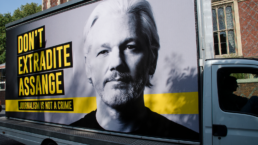By Jeffrey Sterling
It is difficult to talk about happenings in the world other than the continued, appalling Russian invasion of Ukraine and the recent mass shootings in Buffalo, Uvalde, Chicagoland, and elsewhere. Then, there is the Supreme Court which continues down a judicial road of eroding personal rights and towing the conservative party line. I don’t want to take attention away from those outrages. However, the shadow of one tragedy is not dispelled by the light of another.

I continue to have passion to shed light on and right the wrongs of the Espionage Act and how the United States government is using it to target not only whistleblowers, but also anyone who dares reveal its transgressions and illegalities. I was extremely honored to participate in the Belmarsh Tribunal which, in addition to calling for the closure of Guantanamo Bay, also decried the international disgrace that is the potential extradition of Julian Assange. This affront to accountability, press freedom, and freedom of speech is on stage for the entire world to see, yet I wonder who is paying attention.
Assange has been held since April 2019 in Belmarsh prison, which is what many call the United Kingdom’s version of our super-max prison. He has been held in solitary confinement for every moment of every day at Belmarsh while the U.S. makes an incredible effort to have him extradited to face charges of violating the Espionage Act. The U.K. courts have been all too obliging by issuing rulings, with no support in truth, that Assange can and should be extradited. And — in a final blow to demonstrate its willingness to be the puppet government that the U.S. needs to continue its Espionage Act campaign of terror — on June 17th, Priti Patel, the U.K. Home Secretary certified Assange’s extradition, clearing the way for Assange to be turned over to the United States. Assange is appealing, but given U.K. reticence, it is only a matter of time until Assange will find himself, as I did, in the Alexandria jail being charged with violating the Espionage Act.
What I have found quite disturbing is that the U.K. courts and the Home Secretary have been all too willing to play the dutiful puppets to their U.S. handlers. When I was in the CIA, a handler was the person who manages every aspect of an asset’s life that is necessary and helpful for the purpose of collecting intelligence. Sometimes, it is necessary for a handler to be nebulous or downright lie to an asset to keep focus on the objective. If the handler gets what he wants, that is all that matters.
The U.S. has handled the U.K. legal system and government officials very astutely. The U.K. has believed the lies being championed by the U.S. ranging from characterizing Assange as a national security threat and spy to touting a safe and supportive environment Assange will face in U.S. prisons. Yet, the real purpose is to prosecute Assange under the Espionage Act for political and vengeful reasons. U.K. courts have found every reason not to challenge the merits of the U.S. case against Assange, and the U.K. government has followed suit. The U.S. handling of the U.K. should be considered the epitome of utilizing sources and methods to achieve an objective without the asset knowing what it is actually being accomplished.
But, the U.K. doesn’t exactly have clean hands in this travesty. The U.K. version of the Espionage Act is the Official Secrets Act, enacted in 1911, which also deals with ostensibly protecting state secrets. The very U.K. official who signed off on Assange’s extradition has proposed sweeping new reforms which prescribe harsher punishments for journalists and their sources. Under the reforms, the U.K. government will “…not consider that there is necessarily a distinction in severity between espionage and the most serious unauthorized disclosures.” Just like the Espionage Act, complete deference is given to the government to define what is considered serious disclosures. Just like the 1917 American version, the original objective was to fight espionage designed to assist the country’s foreign enemies. Over time, both Acts have evolved as tools to quash. One must wonder which of the countries came up with the idea to use either law to hide government transgressions by silencing whistleblowers. Seems the U.S. and the U.K. are feeding off one-another’s ever expanding objective not to be held accountable for its illegal actions by feigning imagined threats to national security. Indeed, what has been happening to Assange is the very definition of complicity between two countries to jointly undermine accountability and freedom of speech.
My goal with The Project for Accountability of the RootsAction Education Fund has been to shed light on government wrongdoings and illegalities as well as demand accountability from those in power. What is happening with Assange is government running amok over and through the law to reach those who would expose the truth. But who should such a call for accountability be directed to? Unfettered power infects from the top down. Joe Biden should not only answer for, but also explain the purpose and intent for seeking to try Julian Assange for breaking a U.S. law. Yet, as a member of the Obama administration that ignited the firestorm that has been the use of the Espionage Act to punish whistleblowers and avoid truth, he has somewhat expectedly been silent. He should not be able to hide behind any sort of plausible deniability because he was not in charge at the time. And, what about Kamala Harris? Hasn’t she touted a record of supporting protection for whistleblowers? Seems the weight of power and the lack of accountability have a debilitating effect on conscience.
The same inquiry should be made upon the mainstream media. Their lack of interest and silence on Assange are disturbing. Possibly out of self-preservation, the media are holding on to a misconception that they are not the same as Assange, that Assange is not a reporter. Only the arrogance of an egoist would refuse to acknowledge a clear and present danger to press freedom and free speech. Maybe what happened during my persecution holds an answer. When the reporter Jim Risen was in danger of being called to the stand and threatened with jail if he did not testify, the mainstream media mobilized to protect one of their own. Once the danger was over, so was the interest. Much like in my situation, self-preservation will prevent the media from raising a voice. They should understand that if Assange is extradited and convicted, there will be nothing to stop any reporter, anywhere, from being charged under the Espionage Act for merely reporting about government wrongdoing. Their silence, much to their own eventual detriment, is empowering the continued illegal use of the Espionage Act.
But, there has been a promising development. Representative Rashida Tlaib has proposed Espionage Act reforms that would require the U.S. to prove a specific intent to harm the U.S., allow a defendant to testify about their purpose in revealing information, and create an affirmative defense for revelations in the public interest, among other reforms. This is a momentous opportunity for accountability and transparency to return to the rubric of governance. I whole-heartedly support Rep. Tlaib’s efforts as should we all.
I am thankful for the support I have received through The Project for Accountability; it has helped me find a purpose that I didn’t know I needed. Over the years, I have been speaking and writing on behalf of whistleblowers and decrying the Espionage Act as a tool of revenge. Assange’s extradition will be a pinnacle moment for accountability. The U.S. must be called out on its vendetta against Assange and whistleblowers in general. The media and an entire government have refused to make that call, but I will not. I have been where Assange is going, I do not wish that on anyone, including the prosecutors that wrongfully tried me and the jury that wrongfully convicted me.
Jeffrey Sterling is a former CIA case officer who was at the Agency, including the Iran Task Force, for nearly a decade. He filed an employment discrimination suit against the CIA, but the case was dismissed as a threat to national security. He served two and a half years in prison after being convicted of violating the Espionage Act. No incriminating evidence was produced at trial and Sterling continues to profess his innocence. His memoir, “Unwanted Spy: The Persecution of an American Whistleblower,” was published in late 2019. He is the coordinator of The Project for Accountability of the RootsAction Education Fund.
Recent Posts
‘People in Venezuela Can Oppose the Government But Still Reject US Intervention’:
January 18, 2026
Take Action Now CounterSpin interview with Michelle Ellner on Venezuela invasionBy Janine Jackson, FAIR Janine Jackson interviewed CODEPINK’s…
Social Strikes: Confronting ICE and Resisting Authoritarianism
January 17, 2026
Take Action Now An in-depth discussion with Jeremy Brecher on the strategy, potential, and challenges of mass social strikes following the Minnesota…
Israeli Ban on 37 Aid Organizations Expected to Have Devastating Impacts Across Palestine
January 16, 2026
Take Action Now Aid organizations say Israel’s recent ban of 37 groups has dealt a severe blow to humanitarian work across Palestine. In Gaza, it…
U.S. Surging Military Assets To the Middle East To Prepare for War With Iran After Trump Postpones Attack
January 16, 2026
Take Action Now Reports claim that Netanyahu asked Trump to delay the attack as Israel wants more time to prepare for counterattacksBy Dave…




